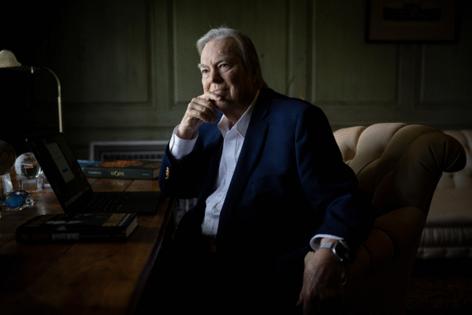Column: Bill Kurtis writes of the adventures of his 'Whirlwind' life as a TV news anchorman
Published in Books News
It’s understandable if you know Bill Kurtis only as an anchorman.
That was his profession for decades, polished with that sonorous voice and often in the company of Walter Jacobson on WBBM-Ch. 2, or nationally alongside Diane Sawyer on the CBS Morning News or, on the less serious side of things, narrating the Will Ferrell romps “Anchorman” and “Anchorman II,” or as the official judge and scorekeeper of NPR’s “Wait Wait … Don’t Tell Me!”
What I will tell you is that if you only know Bill Kurtis for those jobs and accomplishments, you don’t know Bill Kurtis at all. But you will, because he comes at you in substance and even swashbuckling style in “Whirlwind,” his forthright and exciting autobiography that will hit bookstores in mid-September.
The title of Kurtis’ book refers not only to the wild nature of his career but to the event that launched it. It was 1966 and Kurtis was in Topeka, Kansas. He was 25 years old, son of a retired U.S. Marine Corps brigadier general, William, and schoolteacher and bookkeeper Wilma. Bill was a graduate of the University of Kansas, and of Washburn University’s law school, living with his then-wife, Helen, and their baby, Mary Kristin, and studying for the bar exam.
To pay his way through college and law school, he had been working for radio and television stations since he was a teenager. (The family name, Kuretich, was changed to Kurtis on the advice of television execs).
On June 8, he was on camera, reading the 6 p.m. news when a bulletin was handed to him: High winds coming in from the west.
An hour later he was back on screen, reading a weather advisory, when he heard a studio cameraman yell, “Ed Rutherford (a cameraman) is at Burnett’s Mound and there’s a tornado headed for town.” Thirty seconds later, he was handed another bulletin: An apartment complex had just been wiped out.
His mind quickly plotted the course of the twister. He stared into the camera.
He shouted, “For God’s sake, take cover!”
Those five words led to his being hired by WBBM-Ch. 2, going national three years in CBS’s Los Angeles bureau, returning here and, sharing an anchor desk alongside Jacobson, helping create what many still consider, wistfully, the best solid-news operation in Chicago TV history. And on and on.
The past is brought forth in compelling detail. That means that Kurtis either took and kept great notes or has an astonishing memory. He does write, “Every person who appears in these pages (there are 312 pages) deserves my thanks. While writing it I could see their faces again. …They all linger in my memory with the clarity of a sunny morning.”
This book gives us the beginning and early parts of his career, a justifiable perspective because — what many may have forgotten— he was at the center of many of the biggest stories of the last half century. The Charles Manson murder trial? He was there for that, and in the courtrooms of political activist Angela Davis and serial killer Juan Corona. He was the first American to return to Vietnam after the war’s end and reported on the effects of Agent Orange (“The biggest story of my career,” he writes), and on the tens of thousands of children fathered by U.S. soldiers who were left behind in Vietnam after the U.S. withdrawal in 1975.
Closer to home, he was there when the West Side exploded in the wake of Martin Luther King Jr.’s murder; he covered the 1968 Democratic Convention and the trial of the Chicago Seven; he got the first interview with Iva Toguri, better known as Tokyo Rose, who lived in the city and would become, Kurtis writes, “a wonderful auntie to my two kids.” He covered the trial of killer Richard Speck and years later came into possession of a tape that showed Speck having such a grand old time in prison that it would put “a knife in the heart of the Illinois penal system.”
He tells these stories without self-aggrandizing or hyperbole.
Among the most personal concerns his first wife, Helen. They had known one another since second grade and were high school sweethearts of the storybook kind, she a cheerleader and homecoming queen, he the football team’s quarterback. They married, a daughter, Mary Kristin, arrived then and a son, Scott.
Then came cancer and a tragic end for Helen, as he writes:
“Over the next week, I read to her, which she enjoyed. She would stay awake as long as she could and then close her eyes.
“Once she woke up from her drifting consciousness to whisper to me, ‘I’m dying.’
‘I said, ‘I know. Don’t worry about the kids. Everyone has been great. It will all work out.’
“And then, as I was holding her hand, she passed away in her sleep.”
He and we are then back on the road to Africa and dozens of other spots on the globe, other stories. By this book’s end, you will not only have a fuller portrait of Kurtis but will also be left wanting, eager to hear more about his and his parents’ connection to the “Little House on the Prairie” site; his lengthy relationship with wife Donna LaPietra, more than a romantic companion but a collaborator not only in love but business and in restoring natural woodlands and prairies near their home in suburban Mettawa; about his two children as they grew up; his successful documentary career, launched with Kurtis Productions in 1994, manifested in “The New Explorers,” “Cold Case Files,” “Investigative Reports” and “American Greed”; and the deep ties he still has to Kansas.
I have known Kurtis for decades and 30-some years ago visited his Kansas ranch near the town of Sedan for a Tribune magazine story. It was there he told me, “I really do believe that in everything I’m doing here in Kansas I am being led and directed, guided by the hands of my grandparents.”
It has been a rich and rewarding career, life. This is not a book about score-settling or nasty stories or gossip. Kurtis is a gentleman, complimentary about, well, almost everything and everybody.
At the beginning of this engaging book, he writes, “Only now is the storm of life that I’m still caught in starting to come into focus. … Events become memories, and memories become stories. Time can tame the whirlwind into a summer breeze.”
Kurtis will turn 85 on Sept. 21. He is a terrific storyteller, an artful writer and the book’s final words would seem to hint at more to come: “The wind keeps blowing, and the journey continues.”
Good for him. Good for us.
©2025 Chicago Tribune. Visit at chicagotribune.com. Distributed by Tribune Content Agency, LLC.
















Comments